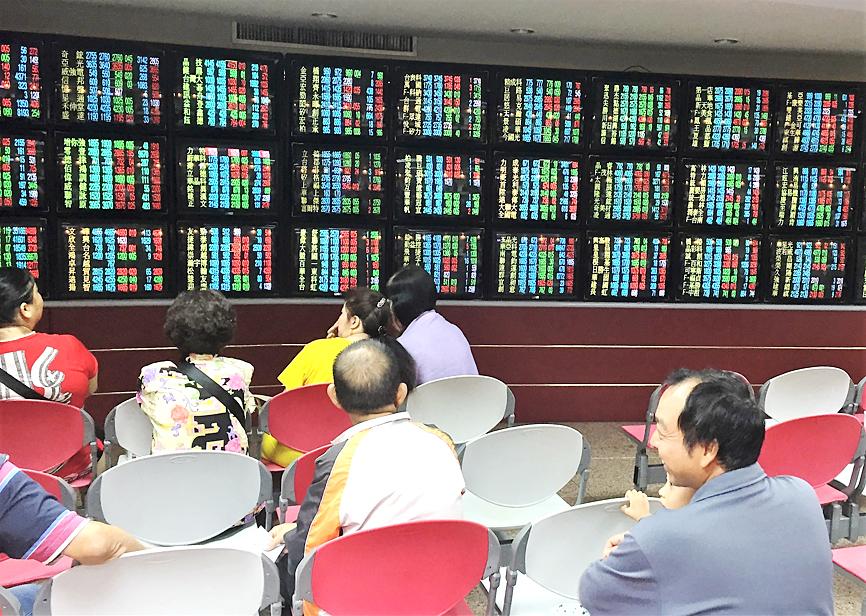The Ministry of Finance, the Financial Supervisory Commission and the National Development Council on Tuesday night reached a consensus on extending the transaction tax cut for day trading for two or three years after it expires at the end of this year, local media reported yesterday.
The three agencies will report the conclusion of their meeting to the Executive Yuan by the end of this month to finalize the extension plan, the reports said.
The government cut the tax for day trading from 0.003 percent to 0.0015 percent in 2017. With the tax cut set to come to an end at the end of this year, concern has risen that the impending end of the incentive led many day traders and investors in old economy stocks to dump their holdings in the past few days.

Photo: Kelson Wang, Taipei Times
However, investors seem optimistic about the tax cut extension, leading to buying yesterday of old economy stocks, including shipping and raw material stocks, Mega International Investment Services Corp (兆豐國際投顧) analyst Alex Huang (黃國偉) said.
The bellwether electronics sector yesterday also reversed earlier losses, giving an additional boost to the broader market, Huang said.
Taiwanese shares yesterday recovered earlier heavy losses caused by volatility on US markets overnight to end a nine-session losing streak and finish the day above the 16,800-point mark, as bargain hunters took advantage of the initial downturn.
The TAIEX closed up 164.91 points, or 0.99 percent, at 16,826.27. Turnover was NT$417.49 billion (US$14.99 billion), with foreign institutional investors selling a net NT$2.24 billion of shares on the main board, Taiwan Stock Exchange data showed.
“Further gains are possible before the TAIEX moves closer to the nearest technical resistance ahead of the 120-day moving average at around 16,960 points,” Huang said.

South Korea’s equity benchmark yesterday crossed a new milestone just a month after surpassing the once-unthinkable 5,000 mark as surging global memory demand powers the country’s biggest chipmakers. The KOSPI advanced as much as 2.6 percent to a record 6,123, with Samsung Electronics Co and SK Hynix Inc each gaining more than 2 percent. With the benchmark now up 45 percent this year, South Korea’s stock market capitalization has also moved past France’s, following last month’s overtaking of Germany’s. Long overlooked by foreign funds, despite being undervalued, South Korean stocks have now emerged as clear winners in the global market. The so-called “artificial intelligence

Chinese artificial intelligence (AI) start-up DeepSeek’s (深度求索) latest AI model, set to be released as soon as next week, was trained on Nvidia Corp’s most advanced AI chip, the Blackwell, a senior official of US President Donald Trump’s administration said on Monday, in what could represent a violation of US export controls. The US believes DeepSeek will remove the technical indicators that might reveal its use of American AI chips, the official said, adding that the Blackwells are likely clustered at its data center in Inner Mongolia, an autonomous region of China. The person declined to say how the US government received

‘SEISMIC SHIFT’: The researcher forecast there would be about 1.1 billion mobile shipments this year, down from 1.26 billion the prior year and erasing years of gains The global smartphone market is expected to contract 12.9 percent this year due to the unprecedented memorychip shortage, marking “a crisis like no other,” researcher International Data Corp (IDC) said. The new forecast, a dramatic revision down from earlier estimates, gives the latest accounting of the ongoing memory crunch that is affecting every corner of the electronics industry. The demand for advanced memory to power artificial intelligence (AI) tasks has drained global supply until well into next year and jeopardizes the business model of many smartphone makers. IDC forecast about 1.1 billion mobile shipments this year, down from 1.26 billion the prior

FORTUNES REVERSED: The new 15 percent levies left countries with a 10 percent tariff worse off and stripped away the advantage of those with a 15 percent rate In a swift reversal of fortunes, countries that had been hardest hit by US President Donald Trump’s tariffs have emerged as the biggest winners from the US Supreme Court’s decision to strike down his emergency levies. China, India and Brazil are among those now seeing lower tariff rates for shipments to the US after the court ruled Trump’s use of the International Emergency Economic Powers Act to impose duties was illegal. While Trump subsequently announced plans for a 15 percent global rate, Bloomberg Economics said that would mean an average effective tariff rate of about 12 percent — the lowest since